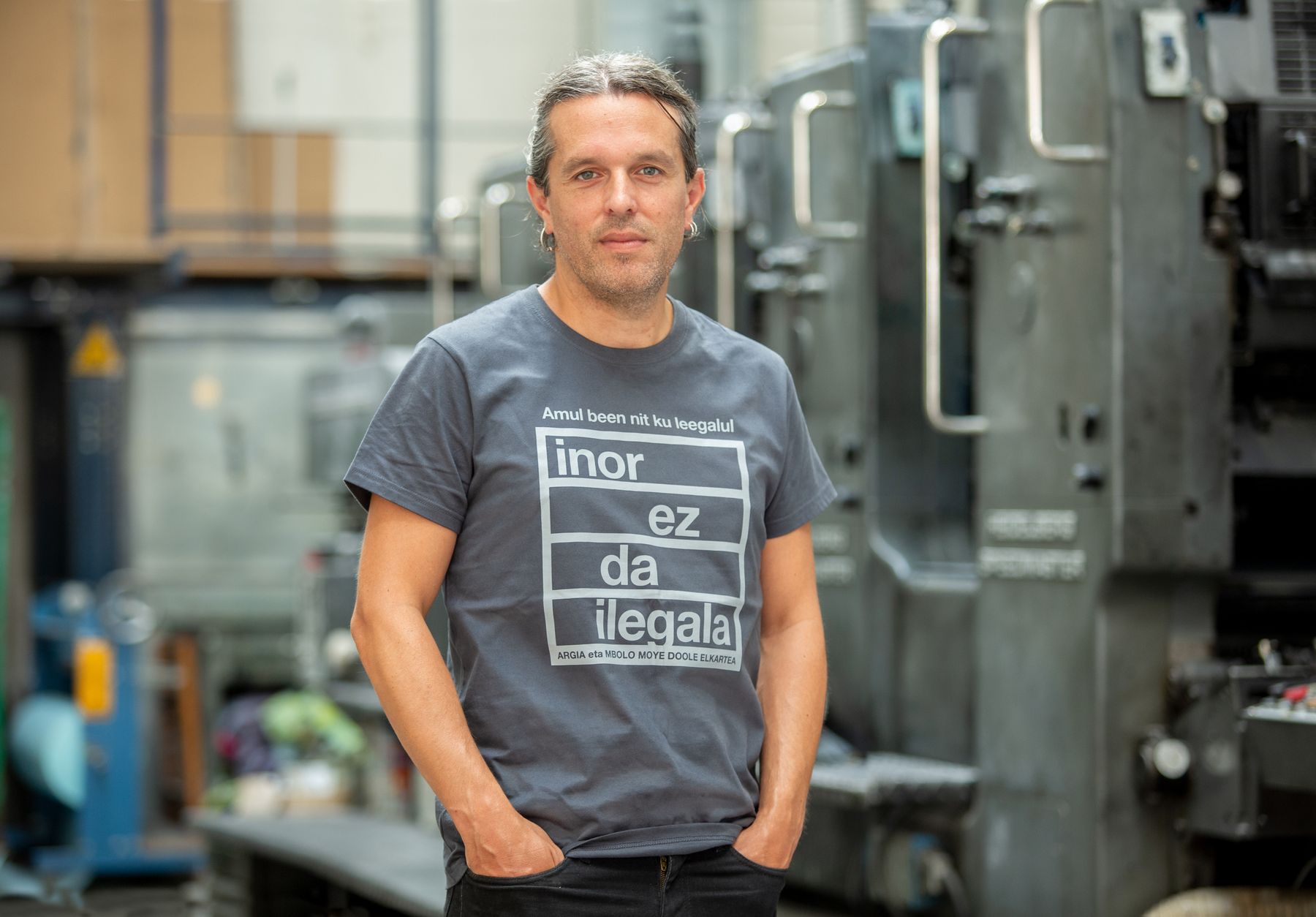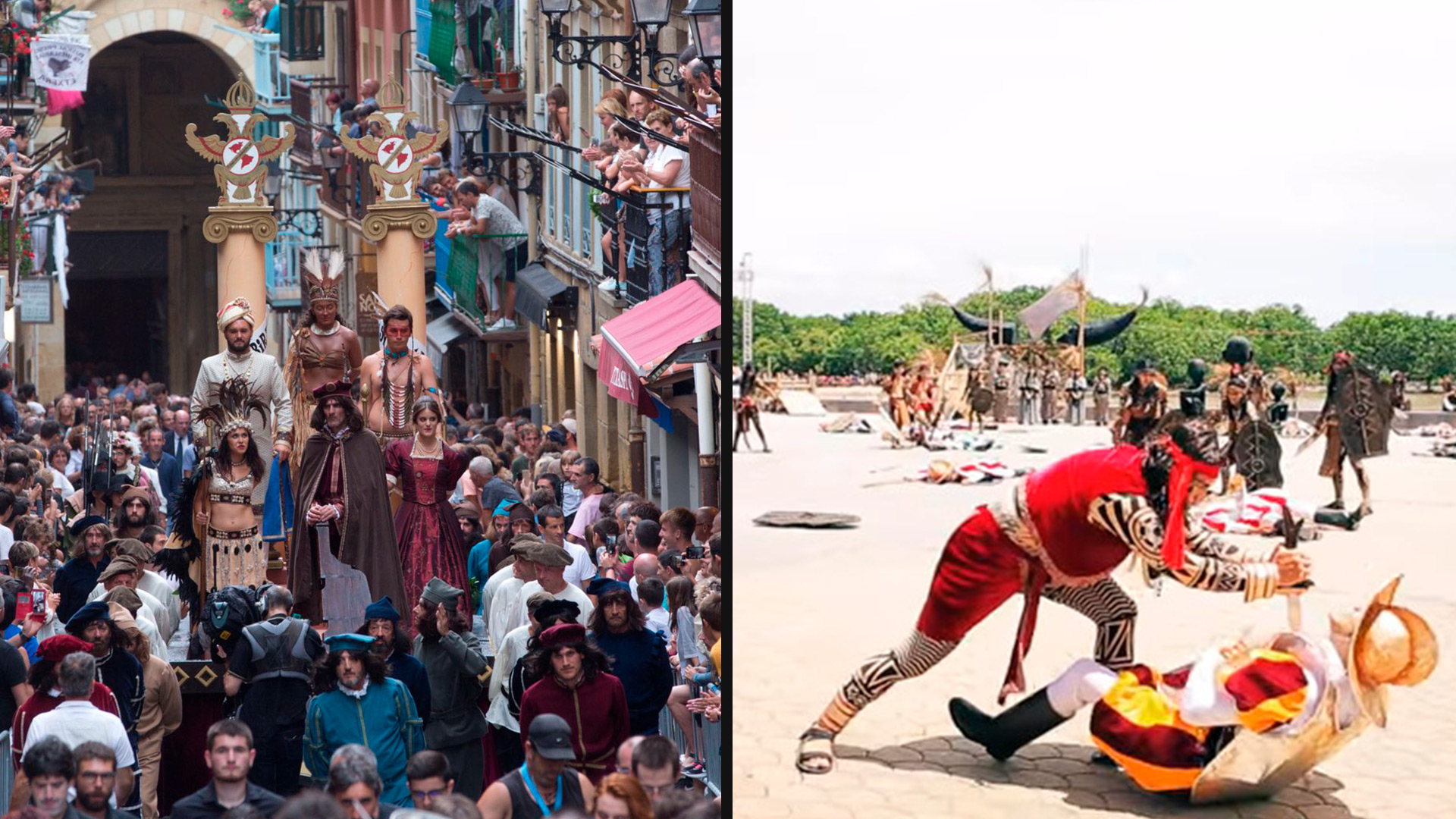"Speeches to our navel have prevailed here when the debate on decolonality is boiling"
- Our hero has written the book López on the occasion of the fifth centenary of the Elkano World Tour and will be published by ARGIA in September. He has analyzed the presence of characters related to colonialism and slavery in the streets of Euskal Herria, considering the need for an international debate on these symbols in Euskal Herria. It says on the back cover: “This is not the skin of ourselves. We weren't there. Then we have no responsibility. But when we celebrate here and now what happened in the past, when we justify it, when we keep the protagonists in privileged places, then yes, the responsibility is ours. Because we are here.”

On the occasion of the fifth centenary of the First World Tour, Elkano’s name is often seen in the last year. Another book about him?
It has been three years of celebrations, and in these three years we have seen everything. How they have organized official celebrations, what speeches have been formed, how critical speeches have appeared, and how others have begun to model the discourse... This is in Euskal Herria or, rather, in the Basque Centre, which is mainly focused in Gipuzkoa and a little in Bizkaia. Meanwhile, at the international level, in these three years the issue has been dealt with differently, from a fatal event. A policeman decided to drown another person with his knee, which initially liberated a debate that had not been raised here in the United States and then in the Anglo-Saxon and South American worlds.
You've looked at history and symbols.
I'm talking in part about Elcano's story and his World Tour, but he also has it about journalism, and most of the speech. As in the world the controversy over the decoloniality aroused by the Black Lives Matter movement has been during these years a very good example of how speeches aimed at our navel have prevailed here, or how those official speeches have been.
In Euskal Herria there are many Basques who had or starred in a direct relationship with colonialism or slavery, conquest, looting, and among them we have names of many in our streets and squares, their bodies in the states of the plazas, or in the lists of the favorite children of the people. Elcano is a drop in a more open sea. I think that is the key.

What is the picture?
In Bilbao, for example, there are about 800 names of streets and squares, and a quick review and without an exhaustive analysis you will discover at first glance that they are priests, missionaries, saints, popes, virgins, marqueses, lords, rich, bankers, politicians... I mean, it's a very accurate picture of the ancient military, political and cultural elite of white men. That is repeated in all cities and towns. In Iparralde with other historical references such as the French Empire and religion. If you go deeper into Hego Euskal Herria, you will see that many of them are those established at certain dates. It is the first moment when the colonies of the Spanish Empire begin to achieve independence, most states, for example, belong to that time: Tribute to Legazpi, Okendo, Urdaneta... When the empire descends, these figures rush to reinforce that imperial grandeur. The second is Franco, for whom the glory of empire also earned them. The placement of the statue of Elcano in front of the town hall of Getaria was the first decision of the Francoist corporation: Sending the telegram to Franco to celebrate the anniversary of the uprising and placing the statue of Elcano in front of the city hall.
I have tried to show that the statue and street names related to colonialism or slavery are not anecdotal.
Some claim these figures, how is this managed?
Catalan historian Josep Fontana said that the function of history is not to discover and expand the supposed fixed truths of the past, but to contribute to creating a collective consciousness according to the needs of today's society or of the time. Using history here and now is an exercise for the future, and when we talk about history, we talk about subjectivity. There is no single story about what happened 500 years ago, as it is not in the armed conflict that has occurred until ten years ago. The question is what future we want to project based on these stories or perspectives. These men who are in the streets and in the plazas can be a reference for some, the truth is that the general picture we have in the public space is absolutely classic, with a bourgeois vision, which hides women and has no critical view of what they were protagonists in very dark times.
They are referents in the public space.
The streets and the states of Euskal Herria of the slaves have been there for many years without any kind of contextualization, naturally. Perhaps many of these men created schools with the money they earned from trading people as merchandise: In Portugalete, Santurtzi, Donostia-San Sebastián, Laudio or Vitoria-Gasteiz this money was used to create infrastructures that benefited the locals. If you want to look at history from this perspective, you can even consider it as a benchmark. But in order for this not to happen again and based on justice and equality, these characters have no place in the world we represent.
Now, for example, some young people have crossed over from Franco, who are not trying to erase the past or to beautify the past, they have done so because in the future they represent the values and the social model they represent have no place. It's a political debate, which is why I've taken advantage of much of the book to question or manifest that privileged place occupied by public space.
We always imagine public space from the eyes of those who are born, educate and see this landscape naturally, but what do those who come from territories that have been victims of colonialism or imperialism, all those who live here and are as Basque as we do, have to think? Therefore, in the book we wanted to give the floor to the members of the Network of Migrated and Racialized Women of the Basque Country. In their speech they state with total clarity and crudety that to consider Elkano as a national reference, as a migrated and racialized woman, is another example of the presence of colonial thought in this Basque society.
This colonial vision is not usually addressed, why not question it?
On the one hand, ignorance, starting with me. Maybe we don’t give it any importance, or those statues, squares or streets that have been “always” have been there and it’s over, and we don’t give them a lot of laps, but just mention something about the people who are in those squares and those statues, someone who comes out in their defense.
For example, a few months ago, works began in the plaza where the statue of Legazpi is located, in front of the city hall, and they put on the table the possibility of moving the statue, because it is annoying in the center, not because it was a conqueror of the Philippines. They asked the political parties for their opinion, and without generating any debate, without controversy, the mayor said that "Legazpi was not a colonizer, but a conqueror, that he did not use violence, and that all the neighbors and neighbors of Zumarraga should be proud to be a character of this kind in the village, as in Getaria Elkano, Ordizia Urdaneta, Okendo and Pasaia." Suddenly there is a discourse that does not appear anywhere, totally Eurocentric, that leaves as anecdote the consequences of colonialism. Being the accounts of 500 years ago, it seems that everything is worth justifying ultimately a message justifying conquest or imperialism.
With Elcano equal?
This debate takes on a new level in anniversaries like this. In the case of Elcano, they want to become the international ambassador of all Basques. The fact that Basque is the first to turn around the world gives rise to this international competition, which is also related to tourism and competition for the possible prestige of the countries. What do the Spaniards claim? What has so far been claimed, a Basque – a Basque – which also underlines it very much, was the greatest feat ever made in the construction of the global empire of Spain, or as Odón Elorza said in the Spanish Congress: “We should use this centenary to make clear the direct and clear role of Basque citizenship in the construction of the Spanish project.”
In Euskal Herria, they have neglected and watered down this Spanish nationalist vision and created a more friendly face discourse. If the Spaniards say that they were the best and the first to go around the world, here it is said that the Basques were the first to go around the world, that the boats that were made in Euskal Herria were the best in the world, that the sailors of the Basque country were the best in the world at that time, etc. We, we and we, the best, the first, the biggest, the fastest, etc. This competitiveness is repeated here, but among the so-called shared values of the Basque citizens that may be more enjoyable, and around this there is a wide variety. Being Elkano humanist, linked to the Renaissance, disobedient, Democratic captain unlike the others... Once this path is taken, Elcano is, as the President of Albaola says, the highest exponent of the vascuity that the Basques carry in the blood.

This figure is consciously used to construct a discourse. How do you imagine a future that is not based on these kinds of symbols and references?
They've created a brand that's very related to economics and sales, and a myth. That's legitimate, myths emerge around the world. Here there have also been a series of characters, events, etc., arising from the conquest of Navarra, which can be useful by those who want to recover the state, others not. The use of history is like this, the question is the value you're expanding according to that use. I think there is the debate.
The writing of this book has been a process of dismantling. I am an independentist, a leftist, or at least I feel like this, and I have idealized some passages that can be used to build that Basque Country that is projected, for example: “The Basques beat us...” The Basques, we, as if I were there, Axier López Rodríguez Torres Molina, 1300 years ago, throwing stones in the area of Roncesvalles, or those Navarros heroes who faced the Spaniards, or I don't know what rebellion was in. But nothing is black or white. The Feminist Movement in that, I believe, has invented that we can be oppressed and oppressive, that Euskal Herria may be tread and that some Basques may be oppressive.
When they create myths, when they put statues in the middle of the plaza, they freeze history and only show a part, which usually corresponds to the interests of the person who places the statue. The debate is the most important thing. In some places the national hero is a poet who has his own statue in the square. I don't know if we need a state to represent ourselves. What I am clear is that we must not have a balance of armed men related to war, to suffering.
Now we are "No to war" They claim and the streets are full of military names, and we want as Basque ambassadors one of those who were surrounded by weapons to conquer the Moluccas. We should think about that. Not everything is black or white, but there's pulp.
Before you write the book, you've given I'm not a colonialist, but -- the talk. How do people see this issue?
In the absence of controversy, this issue has not continued. In the United Kingdom, 130 municipalities that were in the hands of the Labour Party decided to study and remove from public space any street name, square, building or statue related to colonialism and slavery, which means that the level of debate and the impetus of the popular movement that followed was enormous, would not move. Here there is not only no debate, but there are historical characters who were once on altars and who want to climb even higher altars, like Elcano. At conferences, the first is the surprise. The feminist movement has been one of the few agents that has dealt with the issue of decoloniality with all its importance, and that is what it is talking about more. The Elkanori Bira initiative was created for this, but no other structured debate or discourse has been promoted. That is the atmosphere in Spain and in Iparralde and Hegoalde. The present presence and recognition of Basque citizenship linked to colonialism or slavery should be analysed in depth. The book is an example that attempts to spark debate. If anyone wants to see the slaveholders as a businessman or Elcano as a symbol of the skill of the former Basque seamen, unless it is not because not all perspectives are on the table.
Two friends offered a small rap performance in the plaza and musutruk, after a simple popular meal. With a song, we were reminded that a neighbor, a young man, recently passed away. Money had to be raised to return the body to its hometown. Oh, that mother of mine! Your child's... [+]
Unconscious day-to-day exercise has become a topic during your stay in the Basque Country. I haven't been there for many days and I've been squeezing my breath several times... I'm an observer trying to find and rediscover my people. If I didn’t want to see things before or if... [+]

















